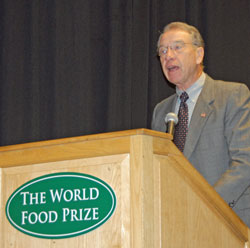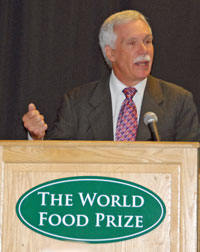The United Soybean Board has been actively building demand for biodiesel on behalf of soybean farmers since 1990 and the opportunities continue to grow on a global basis.
 USB was one of the soybean industry sponsors of the World Food Prize luncheon in Des Moines this week which gave CEO John Becherer, pictured here with one of this year’s WFP winners former Senator Bob Dole, to talk about the role soybeans can play in both feeding and fueling the world.
USB was one of the soybean industry sponsors of the World Food Prize luncheon in Des Moines this week which gave CEO John Becherer, pictured here with one of this year’s WFP winners former Senator Bob Dole, to talk about the role soybeans can play in both feeding and fueling the world.
“The reality is we do have an opportunity and we need to be producing more product so that we can feed more fish, more pork and more poultry,” Becherer said. Since soybeans are 20 percent oil and 80 percent protein, that allows producers to grow a crop that can provide both.
USB’s development of the biodiesel market has the potential also to pave the way for other feedstocks to be used to make biodiesel. “Developing biodiesel directly raised the farm gate value for soybeans and led to the commercialization of biodiesel,” Becherer said. “Other feedstocks such as animal fats were grandfathered in on the biodiesel research and commercialization which has led to expanding opportunities for other feedstocks for biodiesel.”
“I don’t see that stopping,” he continued. “I don’t think that soybean oil ever believed that we would be the be all, end all for producing soybean oil to be converted into biodiesel. As we move forward, I think the opportunities for other feedstocks to play a part in this process are great.”
He adds that alternatives like jatropha hold great promise for improving subsistence farmers in poorer countries.
Listen to an interview with Becherer here:
[audio:http://www.zimmcomm.biz/world-food/wfp-08-becherer-biodiesel.mp3]
You can also download the audio with this link:
John Becherer at World Food Prize (mp3)


 Voters in California are being asked to approve a $5 billion bond measure that is designed to help spur the growth of alternative fuels in the state.
Voters in California are being asked to approve a $5 billion bond measure that is designed to help spur the growth of alternative fuels in the state. Kinder Morgan Energy Partners LP has announced successful testing of ethanol through its 16-inch, 195-mile Central Florida Pipeline (CFP) system between Tampa and Orlando, Florida and the beginning of testing of a biodiesel pipeline in the Southeast U.S.
Kinder Morgan Energy Partners LP has announced successful testing of ethanol through its 16-inch, 195-mile Central Florida Pipeline (CFP) system between Tampa and Orlando, Florida and the beginning of testing of a biodiesel pipeline in the Southeast U.S.  He believes that increasing the use and acceptance of biotech crops is vital. “We’re entering a new generation in agriculture,” Grassley said. “This generation not only encompasses feeding the world, but also fueling vehicles and eventually getting in to treating patients through pharmaceuticals in crops. This offers opportunities for biotechnology growth throughout the world that will continue to feed populations and provide new prospects for our rural communities.”
He believes that increasing the use and acceptance of biotech crops is vital. “We’re entering a new generation in agriculture,” Grassley said. “This generation not only encompasses feeding the world, but also fueling vehicles and eventually getting in to treating patients through pharmaceuticals in crops. This offers opportunities for biotechnology growth throughout the world that will continue to feed populations and provide new prospects for our rural communities.” The answer to feeding a growing world population lies with building on the success of the American farmer, according to Agriculture Secretary Ed Schafer, who addressed the World Food Prize breakfast Friday morning in Des Moines.
The answer to feeding a growing world population lies with building on the success of the American farmer, according to Agriculture Secretary Ed Schafer, who addressed the World Food Prize breakfast Friday morning in Des Moines. The
The  As promised, I’ve got some more material for you from Secretary of Agriculture Ed Schafer, who addressed attendees of the Farm Foundation’s Transition to a Bioeconomy: Environmental and Rural Impacts Conference in St. Louis, Mo.
As promised, I’ve got some more material for you from Secretary of Agriculture Ed Schafer, who addressed attendees of the Farm Foundation’s Transition to a Bioeconomy: Environmental and Rural Impacts Conference in St. Louis, Mo. The president of the World Bank made an appearance at the
The president of the World Bank made an appearance at the  The ability of the world to grow enough agricultural crops to produce both food and fuel was a topic of discussion at the World Food Prize symposium in Des Moines on Thursday, which was also World Food Day.
The ability of the world to grow enough agricultural crops to produce both food and fuel was a topic of discussion at the World Food Prize symposium in Des Moines on Thursday, which was also World Food Day.